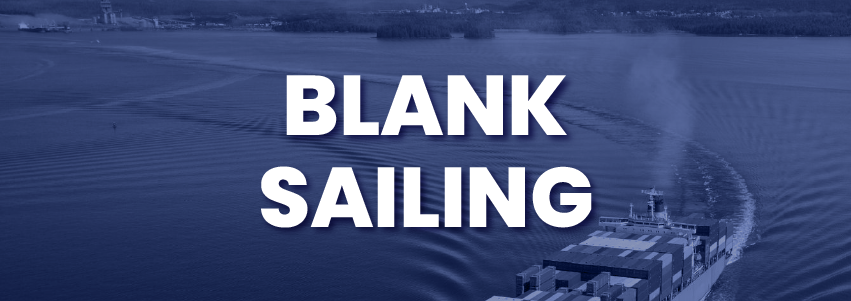Blank Sailing: Definition and Ways to Avoid Its Impact
Table of Contents
Global trade depends on shipping, which guarantees the flow of products over continents. Still, disruptions in this process can have big effects on clients and businesses. "Blank sailing" is one such disruption. In this blog post, we will discuss the blank sailing meaning, its causes, how it affects shipments, and the distinction between blank sailing and port omission.
What is Blank Sailing in Shipping?
A blank sailing definition is the scenario whereby a planned voyage or sailing by a shipping line is canceled, usually for a given port or route. This cancelation essentially leaves "blank" space on the ship before it reaches its designated location. Blank sailings are most often seen in the ocean freight industry, especially in containerized shipping, when the vessel does not sail as intended for various reasons.
Frequent blank sailings disrupt the supply chain, causing uncertainty, delivery delays, and scheduling gaps for cargo owners. Shipping companies may also avoid specific ports or routes, therefore aggravating the uncertainty. Although the causes of blank sailings can be several, their main concentration is on external elements influencing the transportation sector or optimization techniques.
Why do Blank Sailings Happen?
For different reasons, blank sailings happen; shipping lines utilize them to adjust to evolving market conditions. Blank sailings generally result from various factors:
- Low Demand for Cargo: When there is little cargo demand, shipping lines frequently call off sailings. If the volume of products for transportation is too low, it may not be profitable to operate a full vessel. The shipping line might decide to skip the sailing to avoid losing money.
- Overcapacity: Another reason for blank sailings is overcapacity. Shipping lines can decide to postpone some voyages to restore the balance when too many ships are operating on a given route or when world trade slows down. This approach enables shipping lines to maintain ideal capacity levels and lowers vessel-based competition.
- Congestion and Port Delays: Shipping lines may also call off sailings to prevent extended port congestion and delays. Shipping companies may decide to call off voyages to better control their schedules if port terminals are packed or handling backlogs. Furthermore, delays caused by labor conflicts or inclement weather might lead to blank sailings.
- Strategic Operational Changes: Shipping lines can use blank sailings as part of their general operating plans. They may decide, for example, to change plans depending on changing demand, correspond with sailings with peak seasons, or modify cargo quantities to fit. Improving efficiency and lowering running expenses is the general aim.
How do Blank Sailings Affect Your Shipment?
Blank sailings can have a major effect on your shipment and cause several logistical difficulties. Delays, unexpected expenses, and unstable supply chains can all result from these distractions. Here are a few main ways blank sailings could influence your shipments:
- Delayed Deliveries: The delay of supply is the most immediate impact of a blank sailing. The cancellation of the planned trip will force your goods to wait for the next available sailing. Such an event might cause major delays in client reach, therefore upsetting the whole supply chain.
- Increased Costs: Companies sometimes have to locate other shipping routes or reroute their goods when blank sailings arise, which would increase expenses. The outcome could call for using air freight, sending products on several vessels, or transiting through other ports—all of which incur costs not first considered.
- Loss of Cargo Availability: For time-sensitive shipments, such as perishable goods, a blank sailing may result in significant financial losses. Blank sailings can cause delays that cause commodities to be kept in transportation for more than required, consequently perhaps resulting in stockouts, damage, or spoiling.
- Disrupted Schedules: Strict schedules are what shipping companies depend on to guarantee timely delivery of goods. Blank sailings have the potential to disrupt the entire delivery timeline. Particularly for companies whose activities must be coordinated with their shipment timetables, such situations can lead to uncertainty and logistical issues.
- Port Congestion: Cancellation of a sailing could lead to traffic at ports as goods are offloaded or diverted. Delays for the next sailings resulting from these disruptions might cause a domino effect, affecting the flow of goods along the supply chain.
How OPCA Members Can Help Navigate Blank Sailing Challenges?
Members of the worldwide network of freight forwarders specializing in project cargo and logistics specialists known as The Overseas Project Cargo Association (OPCA) are positioned to help companies overcome obstacles presented by blank sailings. OPCA members are experienced in handling shipping disruptions and have expertise in managing complicated shipments containing project cargo.
As experienced ocean freight forwarders, OPCA members offer expert guidance and tailored solutions to mitigate the impact of blank sailings. Their wide-ranging network helps them to rapidly identify substitute transportation paths, maximize cargo management, and guarantee that shipments proceed without difficulties even with disruptions. Whether handling blank sailing ocean freight or rerouting cargo resulting from port omissions, OPCA members are ready to meet various logistics difficulties.
_logo.webp)



